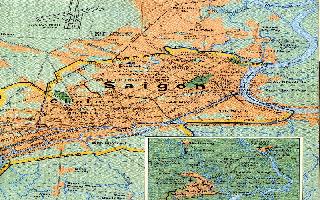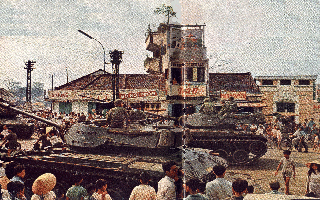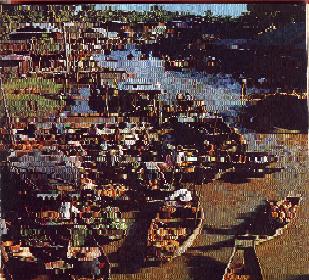My Army in Vietnam YearsBy Beryl DarrahAfter a long flight across the Pacific, into another time zone, into another day, the Northwest Orient Boeing 727 touched down at Saigon's Tan Son Nhut Airport sometime in the early autumn of 1964. No, it didn't touch down; it made an almost nose diving descent onto the runway. A ride that rivalled a roller coaster in thrills. After we had landed, we were told that this is standard procedure in order to reduce the time and range of enemy gunfire. Welcome to Vietnam. We
stepped out into the hot, sultry air of a Saigon afternoon, and
were immediately herded onto busses with heavy gauge wire covering
the windows to reduce the chances of a grenade being thrown into
the bus. The bus drove us briefly off the air base, Home turned out to be headquarters of the U. S. Army in Vietnam---a walled compound of stucco barracks, huts, actually, and an assortment of stucco headquarters buildings with red tile roofs. The first afternoon was spent simply getting used to the place, trying to actually realize that I was really in Vietnam. An air of nervousness hung in the air like the heavy humidity, as soldiers wondered and worried about their next assignment. Luck (and my college education) was with me again. I was assigned as secretary to the Adjutant General of the U.S. Army in Vietnam. That compound would be my home. Top bunk, south side, four bunks from the back door. I
eased into my job a little at a time. But in time, I became a full
fledged member of the office staff, doing in most cases many of
the things that I did at Ft. Benjamin Harrison.. But, this, of
course, was not Ft. Benjamin Harrison. In time, I became
responsible for maintaining casualty figures (and for writing
letters to the parents of soldiers killed in action which were
signed by the As time went by, I gained the trust and confidence of both my boss and the sergeant-major, and as their confidence increased, so did the amount of responsibility which was given to me. Both of them recognized immediately that I had no intention of becoming a "lifer"---and, consequently, I was treated more as an employee that solider. But I did everything possible to do a good job and to keep the office running smoothly and make my superiors look as good as possible. During my first few weeks at Tan Son Nhut, I was assigned to guard duty in remote locations like the ammo dump, which is just what the name says: a storage place for ammunition, rockets, bombs, etc. It was located somewhere on the outskirts of the air base in a remote area (in case of any sort of accident or enemy action), and it was surrounded by layers of razor sharp barbed wire, land mines, and bright lights shining out into the darkness. Guard duty consists of two hours on duty and four hours off duty. The two hours were long, tense, and nerve racking as we walked our post with our M-14's slung over our shoulder. There were three or four guards walking around the ammo dump while the other guards were sleeping. It always seemed rather ridiculous to me to think that three or four soldiers who were trained primarily to work in an office could hold off any sort of enemy attack. Another of my least favorite places was the POL area----this means petroleum, oil, and lubricants. In other words, it was almost as volatile as the ammo dump. Huge tanks of fuel, gasoline, and other type of petroleum products were surrounded again by concertina barbed wire and fences---with a few untrained guards walking around hoping that nothing would happen. In time, all of this changed, when the Marines arrived and were assigned to perform all guard duty. But before this happened, my boss, the Adjutant General, found out that I was performing guard duty and immediately pulled me off. He did it more as a kind gesture, I am sure, but he said that he needed immediate access to me anytime day or night. And he could have found me in the same bar almost any and every night of the week in downtown Saigon. A friend of mine named Ursel Cline and I found an out of the way bar called the Dai Nam on the second floor of a building on the market circle right off Nguyen Hue. We just happened in their one night and found a fabulous guitar player, a fantastic drum player, and an outgoing and talented American singer. We soon became regulars and even had our own table reserved for us in front of the stage. This is where we would sit and drink gin and tonic, talk, visit with other regular patrons and members of the band, and listen to the music. It was always necessary to keep an eye on the clock in order to make it back to the base before curfew, though. We found other bars, too, which we patronized on a regular basis. One near the Saigon River was more cosmopolitan and featured Dixieland music. The other one featured a clarinet player who could have played in any orchestra in the world. It seems that we almost always picked bars on the basis of the music, and even then we catered to places which were typically Vietnamese. We steered clear of bars where large concentrations of American soldiers hung out. These places tended to be loud, very expensive, low class with no live music, and they could also be dangerous. These were the types of places that Viet Cong terrorists picked as targets. Speaking of targets, I was downtown with a friend of mine early on Christmas Eve. We were just wandering around, mingling with the throngs of people and enjoying the festive, but nevertheless pagan, celebration of the Christmas season when a huge explosion rocked central Saigon. Being momentarily stunned, we quickly recovered and dived into one of the typically open store fronts for cover. When we came to our senses, we discovered we had been taking refuge behind a glass display counter, filled with glass figurines. So much for safety. We later learned that one of the large Bachelor Officer Quarters (BOQ) had been the target of a terrorist attack. Someone had driven a small pickup filled with explosives into an underground unloading area and had left it to explode. Incidents such as this became more and more common as my stay in Vietnam continued. After the panic and confusion of the attack, the city took on an eerie and nervous calm. An early curfew was declared in order to clear the crowded streets. After a few brief minutes in our hangout, which almost deserted, we headed back to Tan Son Nhut in order to beat the enforced curfew. Christmas Eve services were held under tight security, virtually surrounded by armed military guards. The next day, Christmas Day, dawned calmer and more relaxed. Bob Hope and his troop of entertainers gave a show on one of the runways. I was part of a few thousand other military personnel who laughed at his jokes about the bombing the night before and about the high state of security present at his performance. This would be first of a string of Bob Hope Christmas shows that I would attend while I was in Vietnam. Even in the midst of war, life tends to take on a familiar, if not comfortable, routine. Even
in the midst of various plots to over throw the Vietnamese
government, some successful, but most of them not, we went ahead
with our work, knowing that whoever won, we would still be there
to funnel in the money and help them with their war. People rarely
got killed in these coup de etat a As the war intensified, the United States presence became more and more visible. When I first arrived in Vietnam, there were only a few thousand U. S. troops stationed there, and they were officially called advisors. The build-up started to escalate in the final months of my tour, however, and by the time I left, there were well over one hundred thousand U.S. military personnel in South Vietnam. There was no longer any pretence at being merely advisors or helicopter pilots or training instructors. It had definitely taken on the characteristics of a real war. Somewhere along the line, I was promoted to E-5, Specialist E-5, to be exact. Briefly, my job also took on a different tone. As work began to build up, we decided to experiment with me working at night to try to take care of some of the backlog of work that was piling up---mostly correspondence on which my boss was getting behind. Luckily, I was able to catch up with most of it in the few nights that I worked. At first I welcomed the chance to work at night without the interruptions of the telephone and the constant parade of people coming though our office. But I soon realized that I am not a night person and had great problems staying awake---even while I was working. Except for the security guards who passed by at irregular intervals, it was a pretty lonely night. There were officers on duty in other offices, but enlisted men don't hang out with officers. About midnight, I would walk over to the Air Force dining hall for "lunch", and that was probably the highlight of the night. It was amazing how many people were eating "lunch" in the middle of the night. Most of them were Air Force personnel who were working on the flight lines or other jobs involved with the round the clock air flights. After a week or two, I went back to work in the day time---back to the welcome telephone calls, the hundreds of interruptions, and the seeming chaos of the busy command office. During
the months that I was stationed at Tan Son Nhut, just outside
Saigon, I began to fall in love with the city, its people, its
mystery and its beauty----at least th As my tour of service began to wind down, there was something in the back of my mind that told me that I probably had not seen the last of this place. The "countdown" to departure is always a nervous and tense time. But also an exciting time of anticipation. Calendars appear on lockers with days crossed out, and pictures of women, divided up like a puzzle, with one part filled in each day until the "lucky" day. In my case, I was eager to return home so I could enroll in college again and receive my certification as an elementary school teacher. My boss, supposedly the second most powerful man in the U, S, Army in Vietnam, assured me that If I arrived back in San Francisco a few weeks early, they would go ahead and discharge me, They would be far too busy to keep someone around who couldn't be reassigned somewhere. So as I climbed on the airplane early that last morning in Vietnam, I had visions of being back home in Sterling, Kansas, in a matter of days. And I would again be free, a civilian, a veteran. But, not so fast. When I arrived in San Francisco, that is where I stayed for the next few weeks until my legal discharge date arrived. I hung around the Oakland Army Terminal doing odd jobs like filling in medical records of troops about to leave for Vietnam. But mostly I just hung out, reading, looking around, and waiting. I made a couple trips into San Francisco, saw a couple movies, but mostly did nothing until that long awaited day when they handed me my honorable discharge and bid me farewell. Now, I was a civilian. Now, I was a veteran. Now, I could join the American Legion. Now I could head home. |

















 through some palm-lined streets lined with make-shift lean-to
which housed people who either worked on the base or who made
money selling to the Americans. Then we entered the sprawling air
base again which would be my home for the next year.
through some palm-lined streets lined with make-shift lean-to
which housed people who either worked on the base or who made
money selling to the Americans. Then we entered the sprawling air
base again which would be my home for the next year.  Adjutant
General), editing the daily bulletin which was published daily by
our office, composing most of the Adjutant General's
correspondence (and typing it, too, at first, although later a
clerk did the actual typing), keeping track of personnel who were
being moved about the country and of those who were leaving, and
other routine stuff like greeting visitors and answering the
telephone.
Adjutant
General), editing the daily bulletin which was published daily by
our office, composing most of the Adjutant General's
correspondence (and typing it, too, at first, although later a
clerk did the actual typing), keeping track of personnel who were
being moved about the country and of those who were leaving, and
other routine stuff like greeting visitors and answering the
telephone.  ttempts.
They were merely the pastimes of the rich, arrogant and immature
power elite of the country. I can remember sitting at my desk
answering the telephone, greeting my boss's appointments, and
making small talk with other people in the headquarters compound
while tanks rumbled through the streets of the air base and planes
circled overhead. Although an alert for us American was
occasionally handed down, we never felt threatened---mostly
because there was never any need to feel threatened. Their power
struggles were probably done with the full knowledge, if not tacit
approval, of the U.S. command.
ttempts.
They were merely the pastimes of the rich, arrogant and immature
power elite of the country. I can remember sitting at my desk
answering the telephone, greeting my boss's appointments, and
making small talk with other people in the headquarters compound
while tanks rumbled through the streets of the air base and planes
circled overhead. Although an alert for us American was
occasionally handed down, we never felt threatened---mostly
because there was never any need to feel threatened. Their power
struggles were probably done with the full knowledge, if not tacit
approval, of the U.S. command.  e
beauty of what it once was. It was a laid back city, even with all
the danger and intrigue which lay just under the surface of its
seeming disorganization and disarray. Something about its nature
appealed to me---perhaps in a way that it didn't to most Americans
soldiers who served there.
e
beauty of what it once was. It was a laid back city, even with all
the danger and intrigue which lay just under the surface of its
seeming disorganization and disarray. Something about its nature
appealed to me---perhaps in a way that it didn't to most Americans
soldiers who served there.